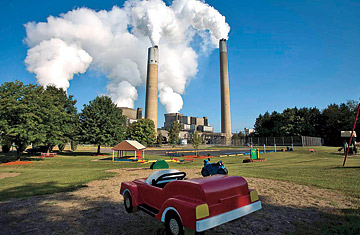
Activists dont want more coal plants, like this one near a Pennsylvania playground.
Nothing could sway the Dominion 11 from their mission--not the cops and certainly not the prospect of free food. Early on the morning of Sept. 15, activists from a range of environmental groups formed a human barrier to block access to a coal plant being built by Dominion in rural Wise County, Virginia. As acts of civil disobedience go, this wasn't exactly Bloody Sunday. The police took a hands-off approach and even offered to buy the protesters breakfast if they unchained themselves. (They declined.) But the consequences were far from trivial. The activists who had formed the barrier to the construction site were arrested and charged with trespassing, and they eventually paid $400 each in fines. That's nothing, of course, compared with the punishment the Dominion plant will inflict on the environment. If completed, the plant will emit 5.3 million tons of CO2 a year into the atmosphere, roughly the equivalent of putting a million more cars on the road.
The future of coal will dictate the future of the climate. Plants in the U.S. that burn this low-cost, high-carbon fuel account for about 40% of the country's greenhouse-gas emissions, not to mention other air pollutants. Right now there are about 600 coal power plants in the U.S., and an additional 110 are in various stages of development. Without ways to capture the carbon burned in coal and sequester it underground, new plants all but guarantee billions of tons of future carbon emissions and essentially negate efforts to reduce global warming. "Business as usual can't continue as long as coal is destroying the climate," says Hannah Morgan, 20, one of the Dominion 11. "We are not going to back down."
Environmentalists are fighting new plants with every weapon in their arsenal, from launching lawsuits over CO2 regulations to lobbying financiers to stop investing in coal. Governors in states like Kansas and Florida are blocking new plants. But to some greens, the threat of new coal plants coming online is so dire that it demands a more corporeal level of engagement. This fall, at the annual meeting of the Clinton Global Initiative in New York City, Al Gore announced, "I believe we've reached the stage where it's time for civil disobedience to prevent the construction of new coal-fired power plants that do not have sequestration."
Hard-core activists like Morgan have already heeded Gore's call. Many work in groups like the Rainforest Action Network (motto: "Environmentalism with teeth") and Rising Tide. But this isn't just the work of coastal élites; on Oct. 26, dozens of locals in Kansas picketed the massive Lawrence Energy Center, the 12th most polluting coal plant in the U.S. Similar protests pop up anywhere a new plant is being built.
"People are willing to put their reputations and their livelihoods and physical well-being on the line for the climate," says Scott Parkin, an organizer for the Rainforest Action Network who has been involved in the Dominion campaign in Virginia. The September protest in Wise County was just the latest in a string of nonviolent acts against Dominion's new coal plant, including a blockade of the company's Richmond headquarters in June.
